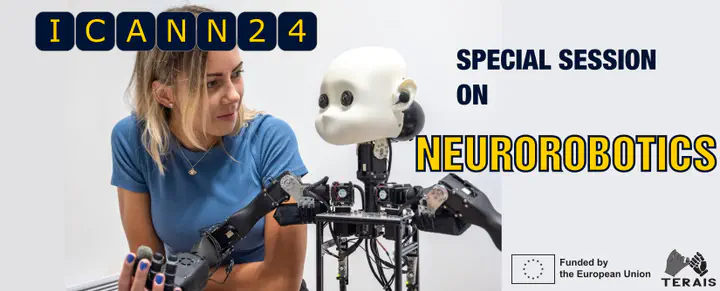ICANN 2024 Special Session in Neurorobotics

After the successful Neurorobotics special session in ICANN 2023 we are announcing a second edition of this session organized under the Horizon Europe project TERAIS. The 33rd International Conference on Artifical Neural Networks ICANN 2024 presents a unique forum to bring together researchers across a wide range of disciplines related to AI and Neural Networks featuring features three main conference tracks: AI and Machine Learning, Bio-Inspired Computing, and the Applications. Our special session brings together researchers with diverse backgrounds and expertise to promote collaboration and knowledge sharing in the field of Neurorobotics and cognitive robotics for HRI promoting the the interdisciplinary research in machine learning, robotics and bio-inspired artificial intelligence.
Following the understanding by building methodology, the research field of Neurorobotics employs neural models in robots that interact with and learn from complex and multimodal environments thus gaining their cognitive abilities. In connection with HRI, cognitive modeling represents a way to make robots more considerate and aware of people as well as make their behavior more legible and explainable and make interaction with robots smoother and more efficient. The list of organizers of this session feature Igor Farkaš and Kristína Malinovská from Comenius University Bratislava, Matthias Kertzel and Hassan Ali of the University of Hamburg and Carlo Mazzola from the Italian Institute for Technology.
Our special session in 2024 features 6 full papers with oral presentations listed below, out of which 3 different contributions were made by TERAIS researchers.
- Claudius Gros, Bulcsú Sándor: Self-organized attractoring in locomoting animals and robots: an emerging field
- Michal Vavrečka, Anastasia Ostapenko: Action recognition system integrating motion and object detection
- Kristína Malinovská, Jakub Mišovský: Robotic model of mirror neuron system: a revival
- Miroslav Cibula, Matthias Kerzel, Igor Farkaš: Learning Low-Level Causal Relations using a Simulated Robotic Arm
- Gabriel Haddon-Hill, Shingo Murata: Active Vision for Physical Robots using the Free Energy Principle
- Michal Vavrečka, Gabriela Šejnová, Jonáš Kříž, Nikita Sokovnin: Modular Reinforcement Learning In Long-Horizon Manipulation Tasks